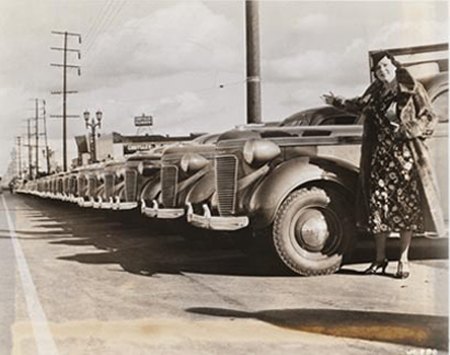Chrysler Suicide Watch 23: Dealer's Choice?
Poor-quality car dealers. You know the score: dodgy facilities, salesmen you wouldn't trust with your pet rock, F&I guys who nickel and dime your paycheck into oblivion and service departments for whom "bilk" isn't just a word- it's a way of life. Industry analysts and desk-chair pundits alike condemn many (if not most) auto dealerships as a cancer on the industry. Believe it or not, car manufacturers share your distaste. Hence the reason the newly excised Chrysler LLC flashed its private equity muscles, threatening to close "underperforming" dealerships. Is that legal?
The short answer is: there is no short answer. Franchising laws come in 50 flavors. These state laws are extremely complex and vary enormously from jurisdiction to jurisdiction. If there's an overarching theme to these statutes, it's that they tend to favor (i.e. protect) the franchisees.
For example, in many states, a franchisor may not terminate or refuse to renew a franchise agreement without legally demonstrable "good cause" for doing so. Franchisees may also sue franchisors for injunctive relief (e.g. a court order prohibiting franchise termination) or rescission (undoing the franchise sales agreement), PLUS damages. Oh, and the Federal Trade Commission can step in to enforce state laws.
So, in business terms, Chrysler can shutter its underperforming dealerships, but their legal bill is bound to be on the Orion's Belt side of astronomical. In fact, any automaker considering cutting dealer deadwood has one word on its mind: Oldsmobile. GM's December 2000 termination of its Oldsmobile franchise is example no. 3 in the OED under the phrase "cataclysmic meltdown." When all was said and done, this little exercise cost General Motors about $1b- not including various intangibles that corporate PR folks might call "good will" or "public image."
Still, it's got to be done. Toyota has 90 American dealers for every percentage point of U.S. market share. General Motors has 300 dealers for every point and Chrysler is nominally better at 270. There is nowhere near enough space to detail all the reasons why this state of affairs is toxic for the American manufacturers. Suffice it to say, the end result is that the dealer bloat is stomping the life-support machine attached to Chrysler's sales numbers and wrecking what's left of Chrysler's battered consumer image.
Chrysler's decision to prune its dealer network can only go two ways. The manufacturer can either simply pay the dealers to shut down or fight them in court. Although the word extortion comes to mind, a pay off would be the quickest and easiest way to make the problem go away. Alternatively, Chrysler's lawyers could say screw you, see you in court; lots and lots of courts. If Chrysler's army of high-priced lawyers loses at trial, it'll cost them a ton of money. If they win at trial, it will still cost them a ton of money.
Chances are they'd win some and lose some and pay through the nose for the privilege. Either way, the bottom line is the bottom line: there's no inexpensive way for Chrysler to trim its dealer network.
There are more devious alternatives. Chrysler could reduce the amount of dealer "holdback." That's the money– roughly two to three percent of a vehicle's retail price– held by the manufacturers prior to sale. Dealers depend on this post-sale cash to book paper profits and make money. Chrysler could make the size of the holdback performance related, or simply drag their heels.
Chrysler might also say "Hang on; we've got some production issues. We've got to allocate our 300Cs very, very carefully. At this point, only five star Chrysler dealers can have Hemi-powered cars." There is precedent: SRT-8's are doled-out by corporate caveat.
While any such moves brings the threat of lawsuit, pretty much everything does. Chrysler can make life hard enough for "bad" Chrysler dealers that they'll have no choice but to send their dealership to the land of Plymouth, Eagle, AMC, De Soto, Nash, the New Yorker, Imperial, Cordoba, Daytona, Cirrus, Concorde, LHS, 440, Dart, Breeze, Spirit, Reliant, Omni and… well you get the idea.
There was one legal development of late, a silver-plated lining to the grey cumulus clouds filling The Big 2.8's sky. In Leegin Creative Leather Products v. PSKS, Inc., the Supreme Court overturned a 96-year old precedent that made any kind of vertical (manufacturer-set) price rules illegal on their face, without any other examination.
Under the old rule, dealers could make patently senseless decisions with prices, like fleece customers for $10k over sticker on a Solstice or mark Trailblazers down so much as to utterly pulverize their residual values. Now that General Motors or Chrysler or Ford can call dealers out on the carpet, they have much stronger control over some of the more foolish moves they make. It can't hurt, but it won't really help.
Latest Car Reviews
Read moreLatest Product Reviews
Read moreRecent Comments
- Fahrvergnugen The only GP we watch - and attend - is SailGP. Feeds a slightly different bunch of adrenaline junkies, though there must be some overlap.
- SCE to AUX Fisker filed for reorganization in Austria - the end is near.https://insideevs.com/news/718875/fisker-reorganization-austria/
- Bd2 I'll watch F1 when Kia and/or Hyundai pony (pun intended) up the cash to field a class leading team. Hyundai is leading many series with the Elantra N with it's incredible 350HP Smartstream-N engine.
- MaintenanceCosts More or less an admission that the radar-only cars will never do anything that could reasonably be marketed as "Full Self-Driving."
- Bd2 The coolest true SUV on the market. Change my mind.


































Comments
Join the conversation
pch101, Even if manufacturers would get in the retail business its not better, and in some cases worse. Its easy to get the cost of any new vehicle, and to know which programs are applicable. Over 30% of consumers are "upside down" in their trade-ins (negative equity), which opens a pandoras box of variables and possibilities. If every customers that steps into a dealer has a vehicle, then 1 in 3 is upside down and will need some creative financials to "roll over" deficiencies from the trade in. Manufacturers narrow the margins on the dealer, the customers are upside down in the trade ins. Its an interesting showroom scenario.
"service departments for whom "bilk" isn't just a word- it's a way of life." That is exactly why I will never buy any GMC vehicle again. Three years of warranty and three years of the same old refrain, from every dealer I went to.... "We can't replicate the problem." Allow me to translate: The defect did not jump out and bite us on the nose and we are unwilling to actually diagnose the problem so, too bad, you are stuck with those defects. Well, I bought the 8-volume shop manual. I was able to trace down the problem points for most of the defects to but one or two components. If I can do it, what can't the supposedly trained SAE rated mechanics at the dealerships? Corporate GMC didn't care, they just told me to "go to the dealer." Okay Chevy/GMC, I was "this" close to buying Toyota. That's where I will go next time. Perhaps Honda. Anywhere but any GMC product.